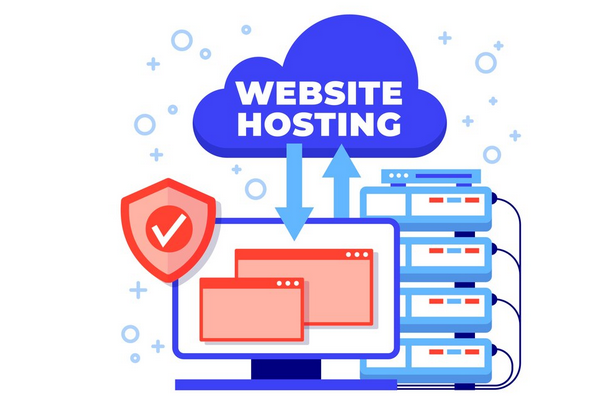A Beginner’s Guide To Website Hosting
In the digital age, having an online presence is essential for individuals and businesses alike. Whether you’re looking to launch a personal blog, eCommerce store, or a professional website, understanding the basics of website hosting is crucial. Website hosting is the process of making your website accessible on the internet, and it plays a pivotal role in determining your website’s performance, security, and overall user experience. If you’re new to this world, don’t worry; this beginner’s guide to website hosting will help you navigate the intricate web hosting landscape.
What is Website Hosting?
Website hosting involves storing your website’s files, data, and resources on a server connected to the internet. When a user enters your website’s URL in their browser, their device connects to the server hosting your site, and the web pages are delivered to their screen. Think of hosting as the digital real estate where your website lives.
Types of Website Hosting
There are several hosting options available, each catering to different needs and budgets. Here are some common types of website hosting:
Shared Hosting
Shared hosting is an economical choice for beginners. In this setup, multiple websites share the same server resources. While it’s cost-effective, it may lead to slower performance during peak traffic periods, making it suitable for smaller websites or personal blogs.
VPS (Virtual Private Server) Hosting
VPS hosting provides a dedicated portion of a server’s resources, offering more reliability and better performance compared to shared hosting. It’s a good choice for businesses and growing websites that need a balance of cost and performance.
Dedicated Hosting
With dedicated hosting, you get an entire server exclusively for your website. This offers maximum control, security, and performance, making it ideal for large businesses and high-traffic websites.
Cloud Hosting
Cloud hosting utilizes a network of virtual servers, making it highly scalable and flexible. It’s a great option for websites with fluctuating traffic and offers excellent uptime and performance.
Managed WordPress Hosting
Tailored for WordPress users, this type of hosting is optimized for the platform’s performance and security. It’s an excellent choice if you’re building a website using WordPress.
Factors to Consider When Choosing Hosting
When selecting a hosting provider, several critical factors should influence your decision:
- Uptime: Uptime refers to the amount of time your website is accessible to users. Look for a hosting provider with a high uptime guarantee, ideally 99.9% or higher, to ensure your website is always available.
- Speed and Performance: Website speed significantly impacts user experience and SEO. Choose a hosting provider with fast servers and optimization features for quicker loading times.
- Customer Support: Reliable customer support is essential. Consider a hosting provider with 24/7 customer service, preferably via various channels like chat, email, and phone.
- Scalability: As your website grows, you may need to upgrade your hosting plan. Ensure your hosting provider offers easy scalability options to accommodate increased traffic and resource demands.
- Security: Website security is paramount. Look for a hosting provider that offers features like SSL certificates, regular backups, and firewalls to protect your website and user data.
- Cost: Consider your budget, but keep in mind that cheaper hosting plans may come with limitations. Strike a balance between cost and the features you need.
- Domain and Hosting: A domain is your website’s address (e.g., www.yourwebsite.com). While hosting and domains are separate services, they are closely related. You can purchase a domain from a domain registrar and link it to your hosting account. Many hosting providers also offer domain registration services.
Setting up Your Website
Once you’ve chosen a hosting provider and secured a domain, you can start setting up your website. Here’s a simplified overview of the process:
- Choose a Content Management System (CMS): Most websites use a CMS like WordPress, Joomla, or Drupal. These platforms simplify website creation and management.
- Install Your CMS: Your hosting provider may offer one-click installations for popular CMS platforms. If not, you can manually install your chosen CMS.
- Design Your Website: Select a website theme or template and customize it to fit your brand and content. You can use website builders or hire a web designer for this step.
- Add Content: Create and upload your website’s content, including text, images, videos, and other media.
- Optimize for SEO: Implement on-page SEO techniques to make your website more search engine-friendly.
- Test and Launch: Thoroughly test your website’s functionality and appearance on different devices and browsers before making it live.
Maintenance and Security
Your website’s journey doesn’t end at the launch. Ongoing maintenance and security measures are crucial to ensure its optimal performance and protection. Here are some key tasks:
- Regular Backups: Set up automated backups of your website’s data and files to avoid data loss in case of issues.
- Software Updates: Keep your CMS, themes, and plugins up to date to patch security vulnerabilities and improve performance.
- Security Measures: Implement security plugins and monitor your website for potential threats, such as malware and hacking attempts.
- Content Updates: Regularly update and refresh your website’s content to keep it relevant and engaging for your audience.
To Conclude
Website hosting is the cornerstone of your online presence, and understanding the fundamentals is essential for anyone venturing into the digital realm. As a beginner, the world of website hosting may seem overwhelming, but by considering the hosting types, essential factors, and following the steps outlined in this guide, you can establish a solid foundation for your online journey. Remember, selecting the right hosting provider and diligently maintaining your website are keys to success in the digital landscape.
In conclusion, your website’s hosting is not just about making your site visible online; it influences the user experience, security, and overall success of your online venture. Therefore, take the time to make an informed decision when it comes to website hosting, and you’ll be on your way to a successful online presence

